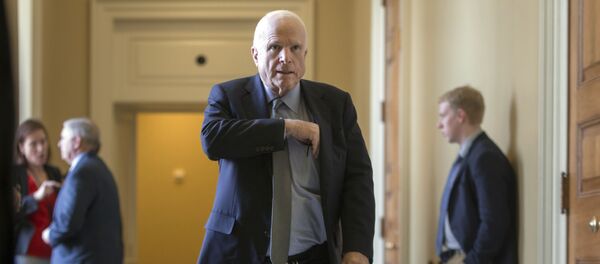But before we get to that, today, controversial, extremist and, perhaps, insane Milwaukee Sheriff David C. Clarke claimed today that he has been appointed to a position in Donald Trump's Dept. of Homeland Security. If true, his appointment would be disturbing. Not only given the number of people who have died in his jail cells, but also because he has, literally, called for about a million people in the US to be rounded up and shipped off to Gitmo, indefinitely, without attorney or trial. Really.
And, along with all of that, the phrase "Obstruction of Justice" is being heard more and more regarding Trump's apparent efforts to shut down the FBI's probe into his campaign associates alleged coordination with Russia during the 2016 Presidential election. So, we are joined today by former Asst. US Attorney, now Professor Randall D. Eliason of George Washington University Law School to discuss what "Obstruction of Justice" actually means, in both the criminal sense (as it might apply in an indictment) and in the political sense (as it might apply in Articles of Impeachment) Eliason recently discussed both applications in a lengthy article at his Sidebars Blog.
"The important thing," he tells me today, "is to distinguish between Obstruction of Justice in the broader sense — the way the term gets thrown around a lot — and the more narrow criminal sense of an actual criminal violation that fits the Obstruction of Justice statutes. That's a much higher standard to prove beyond a reasonable doubt, all of the elements of an actual crime, as opposed to a more general claim that the President is kind of violating all these norms and rules and traditions that we have about not interfering with ongoing investigation, appearing to pressure the FBI Director, things like that."
The key issue, Eliason explains, is whether there was "corrupt intent" in the many different incidents that now appear as Trump's obstruction. "It's not enough if the President does something that just has the effect of hurting the investigation, as a kind of side effect. The prosecutor would have to show that was what he set out to do — he had the wrongful and deliberate intent to try to thwart, in (the Flynn) case, the ongoing grand jury investigation."
As to the use of Obstruction of Justice as used in Articles of Impeachment against a President, there is a different standard, which Eliason also explains. We discuss the cases (and defenses) being built for both types of obstruction, whether a sitting President can actually be indicted on criminal charges, and also the meaning of another phrase being bandied about of late: "abuse of power".
In the course of the conversation, we also discuss the likelihood of impeachment and the potential application of the 25th Amendment remedy as a way to remove Trump from power and the need for a Special Counsel to be named by the Dept. of Justice.
No sooner do we complete that conversation, than the huge news breaks late today that, indeed, former FBI Director Robert Mueller has been named by Deputy AG Rod Rosenstein as Special Counsel to take over the the FBI's probe into "any links and/or coordination between the Russian government and individuals associated with the campaign of President Donald Trump"
You can find Brad's previous editions here. And tune in to radio Sputnik three hours a day, five days a week, at 5 pm GMT.
Have you heard the news? Sign up to our Telegram channel and we'll keep you up to speed!

